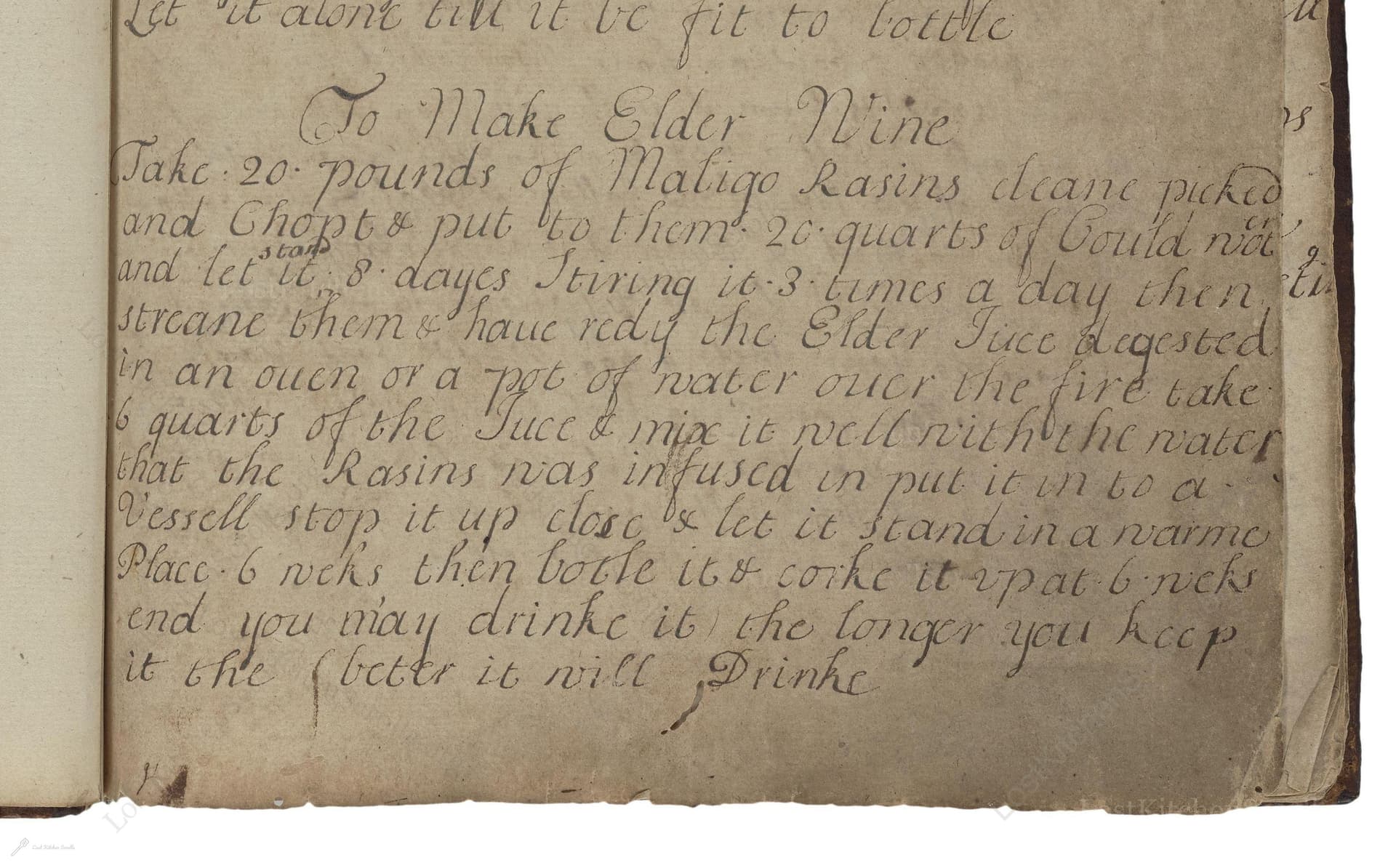To Make Elder Wine
From the treasured pages of Mrs. Rachel Kirk Book 1707
Written by Rachel Kirk

To Make Elder Wine
"Take 20 pounds of Maligo Rasins cleane picked and Chopt & put to them 20 quarts of Could water and let it stand 8 dayes Stiring it 3 times a day then streane them & have redy the Elder Juce digested in an ouen or a pot of water ouer the fire take 6 quarts of the Juce & mix it well with the water that the Rasins was infused in put it in to a Vessell stop it up close & let it stand in a warme Place 6 weks then botle it & corke it up at 6 weks end you may drinke it the longer you keep it the better it will Drinke"
Note on the Original Text
Early 18th-century recipes were instructional, not precise: quantities and timing relied on household experience, and measurements varied widely. The spelling ('Maligo Rasins', 'Could water', 'ouen', 'vessell', 'botle') reflects both orthographic variation and regional dialects of the time. Recipes were often continuous prose, omitting step-by-step breakdowns or temperature control instructions we expect today. Still, the methods are clear: ferment first, blend with fruit juice, ferment again, and age—resulting in a rustic, robust country wine.

Title
Mrs. Rachel Kirk Book 1707 (1707)
You can also click the book image above to peruse the original tome
Writer
Rachel Kirk
Era
1707
Publisher
Unknown
Background
A remarkable collection of early 18th-century recipes, Rachel Kirk's work invites readers into the kitchens of the past where classic culinary traditions and timeless flavors come alive. Expect a charming medley of savory feasts and sweet treats reflective of the era's sophisticated palate.
Kindly made available by
Folger Shakespeare Library
This recipe comes from the early 18th-century household of Rachel Kirk, dating to 1707, in an era when home winemaking was both a necessity and a creative endeavor. England at the time lacked plentiful indigenous grape production, so cooks relied on imported sweet raisins and native fruits like elderberries to craft rich, flavorful wines that could be enjoyed throughout the year. Elder wine had a reputation as both a pleasurable drink and a health tonic, believed to warm the body and protect against winter chills. Recipes like this were shared, adapted, and treasured by women overseeing the domestic arts.

In Kirk’s kitchen, this wine would be started in a large wooden or stoneware tub, stirred with a sturdy wooden paddle. Straining would be done with linen cloths or hair sieves, and the elderberry juice would be gently 'digested' by setting the vessel in a hearth-side oven or placing a clay pot in a simmering bath on the fire. Fermentation took place in a barrel, keg, or stoneware crock, later stopped with a waxed or wooden bung. Bottling would have involved using glass bottles, sealed with natural corks or even wax.
Prep Time
1 hr 30 mins
Cook Time
0 mins
Servings
55
We've done our best to adapt this historical recipe for modern kitchens, but some details may still need refinement. We warmly welcome feedback from fellow cooks and culinary historians — your insights support the entire community!
Ingredients
- 20 lbs Malaga (Maligo) raisins (or use regular dark raisins if unavailable)
- 5 gallons cold water
- 1.5 gallons prepared elderberry juice (from about 22 lbs elderberries or use 100% unsweetened elderberry juice as substitute)
Instructions
- Begin by roughly chopping 20 pounds of clean, good-quality Malaga (also called Maligo) raisins and combine them with 5 gallons of cold water in a large, food-safe bucket or fermenter.
- Stir the mixture three times daily, allowing it to ferment gently for 8 days at room temperature.
- Meanwhile, prepare 1.5 gallons of fresh elderberry juice (from about 22 pounds of elderberries), gently heated either in a baking dish in a low oven or in a heavy pot set inside another pot of simmering water, until it becomes slightly thicker and full-flavored—think of it as lightly cooked rather than boiled or jammed.
- After 8 days, strain the raisin liquid well to remove solids.
- Mix in the 1.5 gallons of prepared elderberry juice.
- Pour this combined liquid into a large, clean fermentation vessel.
- Seal it with an airlock or stopper and let it ferment in a warm place (ideally 65–75°F) for six weeks.
- After this period, bottle the wine and cork securely.
- The wine can be enjoyed at six weeks but is even better if matured longer.
Estimated Calories
120 per serving
Cooking Estimates
You will spend about 1.5 hours preparing the ingredients, including chopping raisins and juicing or heating elderberries. There is no time spent cooking, just light heating of juice. Most of the time is passive, waiting for fermentation. Each serving has about 120 calories, and you'll get about 55 glasses of wine from this recipe.
As noted above, we have made our best effort to translate and adapt this historical recipe for modern kitchens, taking into account ingredients nowadays, cooking techniques, measurements, and so on. However, historical recipes often contain assumptions that require interpretation.
We'd love for anyone to help improve these adaptations. Community contributions are highly welcome. If you have suggestions, corrections, or cooking tips based on your experience with this recipe, please share them below.
Join the Discussion
Rate This Recipe
Dietary Preference
Main Ingredients
Culinary Technique

Den Bockfisch In Einer Fleisch Suppen Zu Kochen
This recipe hails from a German manuscript cookbook compiled in 1696, a time whe...

Die Grieß Nudlen Zumachen
This recipe comes from a rather mysterious manuscript cookbook, penned anonymous...

Ein Boudain
This recipe comes from an anonymous German-language manuscript cookbook from 169...

Ein Gesaltzen Citroni
This recipe, dating from 1696, comes from an extensive anonymous German cookbook...
Browse our complete collection of time-honored recipes



